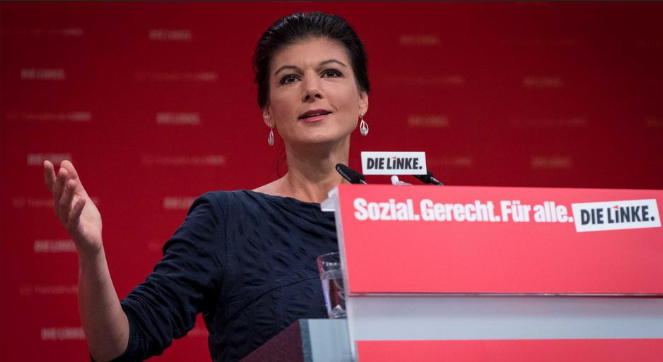
The Free State of Thuringia is one of the sixteen states in the German federal republic, with a population just over 2.1 million. Normally, little of importance would come from Thuringen – but the state elections earlier this month have upset that. The much-feared Alternative fuer Deutschland party – regularly dismissed as neo-Nazis by the opinion-shapers in the mainstream media – won 33% of the total vote, taking first place.
Mainstream commentators were aghast at the AfD’s success, labelling it a return of Nazism. But in the hysteria over the AfD result, other results with deep implications have been missed.
One of the most striking of these was the Buendnis Sahra Wagenknecht winning 15.7%.
The BSW is also nationalist and also opposes Germany getting sucked into the war in Ukraine. Hence, they are as anti-Establishment as the AfD. But, unlike the AfD, they are a leftist movement that wants to empower the negotiating position of workers, and which has no interest in the Christian dogma so common to alternative right movements (the BSW also lists ‘reason’ as one of its two core values).
Sahra Wagenknecht is a former top-ranking Die Linke (The Left) candidate, which means that she’s coming from a very leftist perspective. If the AfD had done well and the BSW not, it might be possible to blame everything on TikTok. But because the BSW also did so well, it’s impossible to speak of a “right-wing wave”. The BSW winning over 15% shows that support for nationalism, not just support for the AfD, is what’s rising.
Perhaps the most striking change from the previous election was the collapse of Die Linke. They were the biggest party in 2019, with 31% of the total vote. Their 2024 vote was a much humbler 13%. The vast bulk of this fall can be attributed to the rise of the BSW, which didn’t exist in 2019.
In total, the nationalist bloc of AfD and BSW won 48.7% of the Thuringen vote, more than the 47% for the globalist bloc of CDU (23.6%), Die Linke (13%), SPD (6.1%), Gruene (3.2%) and FDP (1.1%). Nationalists outpolling globalists in a Western European region the size of Thuringen is something unprecedented since World War II. Since that war, nationalists have been reduced to small minorities. For them to become the majority again, anywhere, came as a shock to many.
Even more shocking was the voting breakdown.

The first result of note here was that some 49% of working-class voters in Thuringen voted AfD, and a further 16% voted BSW. This means that 65% of working-class voters went for a nationalist party, as opposed to a mere 30% for the five major globalists.
This is a remarkable result because it speaks to the extent to which working-class people feel themselves betrayed by the globalist establishment, in particular the leftist globalist establishment.
One of the issues that forced Sahra Wagenknecht out of Die Linke (along with COVID-19 measures and Ukraine/Russia policy) was German refugee policy. Die Linke supported the globalist approach of constantly and permanently increasing the refugee quota. Wagenknecht abandoned Die Linke in the belief that many left-wing voters would prefer a nationalist option to a globalist one, and she has been vindicated by this month’s polling.
Of even more import is the fact that this process has just begun. The AfD has been around for a while but the BSW is new. If they can already poll this high in a regional election, they can dream of doing so at a federal level. Then the possibility arises of an AfD-BSW coalition ruling Germany.

The second result of note here relates to age. If one looks only at voters aged 18-24, who are traditionally globalist left voters, we can see a radical seachange towards nationalism. 55% of men and 46% of women in this age group voted for one of the two nationalist parties.
The only real supporters of the establishment now are the Boomers whose rental property portfolios and stock portfolios are the prime beneficiaries of mass immigration. The Western ruling classes have denied for 80 years that mass immigration leads to higher rents and lower wages, but the people of West widely understand now, and the working-class understands well. Many of those people are now desperate for an anti-establishment alternative.
As the Boomers continue to die off over the next decade, globalist sentiments in the West will continue to weaken further. Those who believe that nationalists are only rising because of social media may succeed in banning that social media to a major extent. But they won’t stop what’s coming, because it’s not a social media phenomenon. It’s the inevitable end consequence of many tens of millions of unpleasant encounters with the diversity that the globalists have imported.
These results of note, taken together, suggest that the vast majority of young, working-class men in Thuringen are now nationalist. Perhaps then, a smaller majority of young, working-class men in the West in general might be nationalist. This means that the nationalist forces now control the loyalties of the precise demographics needed to control the streets – or overthrow the government.
*
For more of VJM’s ideas, see his work on other platforms!
For even more of VJM’s ideas, buy one of his books!
*
If you enjoyed reading this piece, buy a compilation of our best pieces from previous years!
Best VJMP Essays and Articles of 2023
Best VJMP Essays and Articles of 2022
Best VJMP Essays and Articles of 2021
Best VJMP Essays and Articles of 2020
Best VJMP Essays and Articles of 2019
Best VJMP Essays and Articles of 2018
Best VJMP Essays and Articles of 2017
*
If you would like to support our work in other ways, make a donation to our Paypal! Even better, buy any one of our books!




